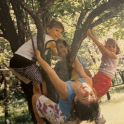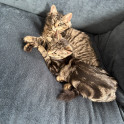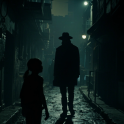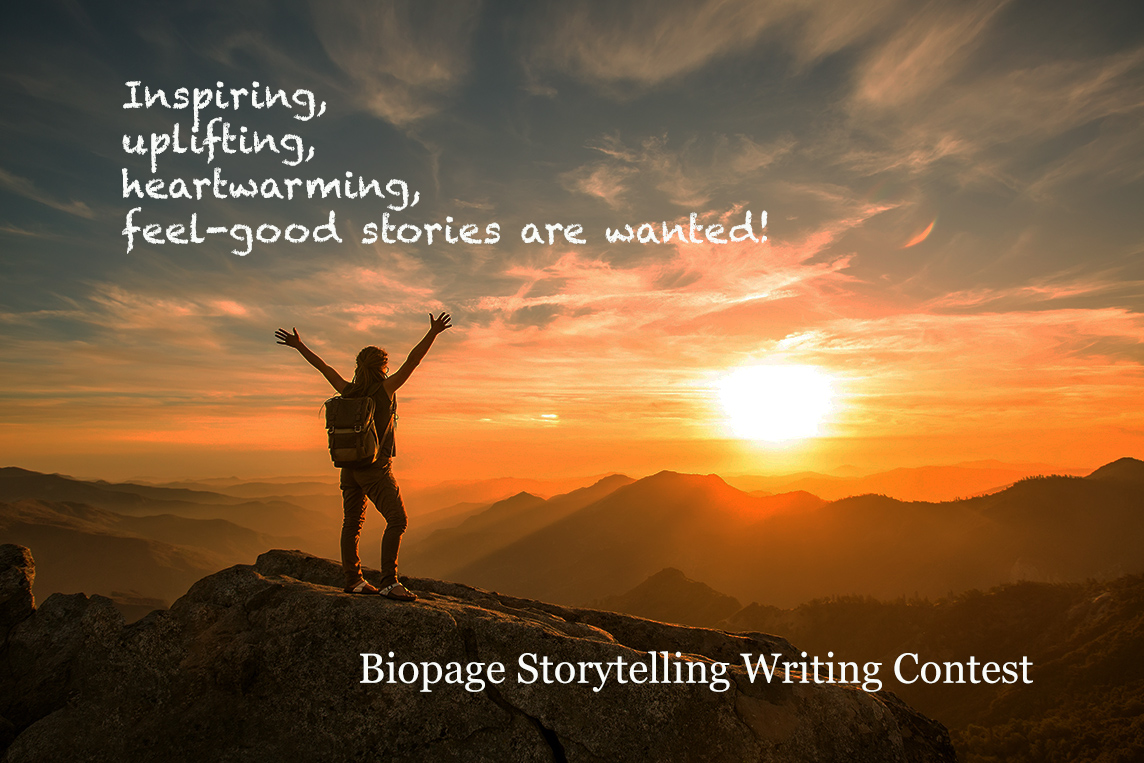Ten-year-old Diwa sat folded into the quiet corner of her room with her back pressed against the cool, unyielding wall as if she needed something solid to lean her small world against. In her hands, two dolls dangled, one in each palm. She lifted them gently and her lips parted without sound, shaping the words she wished they could speak. Diwa didn't like making noise. Not because she disliked her voice, and not because she was shy. Simply because silence was the safer option. “PUTANGINA! GAGO KA?” Diwa froze. The dolls slipped slightly in her hands and a tight feeling bloomed in her chest. She didn't think. Her body moved before her mind did. She set the dolls down with trembling care and pushed herself up from the floor, leaving the wall that could no longer anchor her. Diwa was scared, but only the words scared her. She wasn't scared to walk towards the sound, nor was she scared to help her mother. She creaked open the bedroom door and saw what she was used to seeing. It didn't happen every day, but it happened enough for Diwa to know her “routine”, the one she never named but had memorized in her bones. She slipped through the doorway and rushed forward. She grabbed the nearest pillow with both hands and darted towards her mother, holding it up like a fragile shield. It wasn't much, but it was what she had learned to do. Diwa wasn't the type to fight back. She didn't have the confidence to raise her voice or her hands, especially not against her own father. But it wasn't only the lack of confidence that held her still, it was belief. Belief that her father wasn't truly like this, that he didn't mean to be. That the man behind the fists and violent words was someone gentle, someone she could someday have a real relationship with, like the kind all her friends seemed to have without trying. And despite everything, she still loved him. Despite the cruel words, the sharp corrections or the way he struck her hands with the edge of a pencil whenever she wrote the wrong answer. She still opened her math books with hope, reading her science chapter carefully hoping to see a once in a blue moon smile, and a soft, “Good job, Diwa.” It never came. Now, Diwa was seventeen. Her relationship with her father hadn't gotten much better but it hadn't gotten worse either. She was applying to college now, a milestone she had imagined would feel freeing. But there was one problem, Diwa didn't want to major in STEM like her father demanded. She sat with that truth for weeks, the question pressing her mind, How do I tell him? Do I even tell him at all? But Diwa had a stubborn mind, one that refused to spend the rest of her life trapped into her father's idea of a “perfect child.” So she told him. “I want to major in English.” The outburst was immediate, exactly what she had imagined would happen. “I didn't raise you like this, anak.” Surprisingly, Diwa remained calm. “Why can't you be more like your cousins?” he snapped. “They do what they're told without being asked.” Diwa steadied herself with one breath, then a second, her frustration slowly easing. “Every child has their own capabilities,” she finally said. “Their own desires. Their own dreams.” She held his gaze. “And if you're so fond of people who aren't your children, why have children at all?” She paused, letting the weight of her words settle. “If you want something you can control so badly, then breed horses. Why have children?” Her father didn't say another word. Diwa turned and left the house, her steps echoing in the hallways she had known for all her life. Weirdly, she felt like she had “won”, even though she now had to face college tuition and finding some sort of shelter on her own. She knew life would get impossibly harder after cutting off her only source of family. Happiness had seemed unreachable with no money, no home, no freedom. But maybe that was the point, to take the first step toward a life that belonged entirely to her. With no hope, she reached out to friends she hadn't spoken to in months, due to being locked in her home under study and expectation. Unexpectedly, they welcome her in. Diwa was surprised at how forgiving people could be. They welcomed her back as though no time had passed, as though distance and silence could be erased with simple kindness. For the first time in years, Diwa also got to visit her mother's grave. Forbidden for so long, she now stood before the moss-covered stone. Strangely, she didn't feel sadness, only relief. Relief for herself and her mother. Both had escaped the “hell” they'd been trapped in. Reconnecting with friends and meeting new people, she discovered life brimming with possibility. Diwa even found love, a guy named Max, who reminded her the world was bigger than fear. She had left the cage, the mold and for the first time, she felt the exhilarating truth, she belonged to no one but herself.
THE NOSTALGIA OF CHILDHOOD: The Shift from Childhood to Teenage hood OH! how fast we grew from the little child we were who once lived a carefree, stress free and fun filled life to becoming a teenager within the blink of an eye. Oh, how time files. A time when joy came from cartoons, playgrounds, and our imaginations. We ran barefoot on dusty roads, laughed till our stomach ached, and cried only when our toys were taken away. Those were the days the world felt safe. Back then, all we had to do was eat and play, we never had to worry about bills, responsibilities, or expectations. Sometimes, I wish I could stay a child forever, but sadly, teenage hood has dawned on us, ushering us into the kaleidoscope of life. Little did we know that this new phase would bring along so much confusion, growth, pressure, and self discovery. Oh, how I miss those nostalgic moments of childhood, when we played in dirt without a care, came home messy and smiling,watching cartoons without understanding much of it, and still laughed like it made perfect sense. Back then, joy beamed from our hearts, and smiles never left our faces. We didn't care about how we looked,what people thought, what the society expected or tried to compare ourselves. The times where jealousy didn't cloud our hearts, times where we were all like one big family. No hatred, no gossip, no betrayal; just pure friendship and oneness. Even when our parents warned us not to play with the neighbor's children or even someone else's child because they were bad kids, we still went anyways because, in our little minds, connection mattered more than caution. No emotional stress, no pressure, just freedom. Childhood made me feel effervescent and garrulous, full of life. Truly, childhood memories are priceless. Now as we stand on the edge of teenage hood, we find ourselves looking back missing that innocence. Now, I find myself wondering what this new phase holds. As I go to places, I experience sonder, the sudden realization that everyone has a story. I look at other young people like me and ask myself, "What's going on in their minds too?", because this new phase has brought more than we expected; emotion, peer pressure, silent battles and the need to find ourselves. The shift is sudden, one day you're chasing butterflies, the next you're chasing purpose. WELCOME TO TEENAGEHOOD
Development and growth in any society hinge upon the establishment of an orderly framework of behavior that accommodates everyone. This includes creating effective systems for resolving disputes, addressing crimes, and fostering a collective understanding of the need to obey rules and regulations. These rules form the very foundation upon which a better society is built. To illustrate this, I will share a story that encapsulates the essence of what I wish to convey. The Story of Mr. Adamu Mr. Adamu was a retired civil servant who dedicated forty years of his life to working in the Ministry of Information. During his tenure, he rose to the position of director. However, despite his influential role, Mr. Adamu consistently ignored opportunities to engage in community sensitization programs. These programs could have educated citizens and security operatives about the importance of lawful behavior and the role of regulations in ensuring societal harmony. His focus was instead confined to bureaucratic tasks, leaving broader societal concerns unaddressed. Time, as always, took its course. After four decades of service, Mr. Adamu's career came to an end, and he retired to a quiet life in his estate, known as PPPN Platform. As a respected elder and former public servant, he often took morning walks along the estate's serene streets. Despite his position and status, he remained indifferent to the activities around him. He neither intervened in nor raised awareness about issues concerning societal growth and development. The Setting A major route in the estate served as Mr. Adamu's regular walking path. Along this route was a checkpoint manned by a group of security operatives notorious for extorting money from motorists. This daily extortion had become an accepted norm, a symptom of systemic decay ignored by many, including Mr. Adamu. Interestingly, the head of the security operatives at this checkpoint was Mr. Adamu's former classmate. This connection offered Mr. Adamu a unique immunity. The head of the unit had instructed his subordinates to always show respect to Mr. Adamu whenever they saw him. Thus, Mr. Adamu walked past the checkpoint daily, unconcerned about the corrupt practices occurring right before his eyes. The Incident One fateful day, tragedy struck. Mr. Okoya, a tricycle rider and neighbor of an army officer, returned home to find the officer's pregnant wife lying unconscious on the floor. Alarmed, he and his wife hurriedly carried the woman into their tricycle, intending to rush her to the nearest hospital. As they approached the main road, Mr. Okoya switched on the tricycle's hazard lights to signal the urgency of their mission. Unfortunately, the security operatives were already stationed ahead, preoccupied with their routine of extorting money from motorists. Mr. Adamu and his former classmate were standing nearby, reminiscing about their school days and oblivious to the unfolding drama. When the security operatives spotted Mr. Okoya's tricycle, they interpreted his haste as an attempt to evade their checkpoint without paying the usual bribe. Despite the visible distress signals and his wife's frantic shouting from inside the tricycle, the operatives decided to act. As Mr. Okoya accelerated to bypass the checkpoint, one of the operatives struck the tricycle's windshield with a heavy stick. The loud crash startled Mr. Okoya, causing him to lose control of the tricycle. In the ensuing chaos, the tricycle veered off the road and crashed into the barricade erected by the operatives. The aftermath was catastrophic. Mr. Adamu, his former classmate, and the pregnant woman all lost their lives in the incident. Mr. Okoya and his wife sustained severe injuries but survived. The question arose: who was to blame for this tragedy? Reflections This story is a stark reminder of the societal decay that stems from negligence, corruption, and indifference. Mr. Adamu's apathy toward societal issues during his career and retirement exemplifies how ignoring small acts of misconduct can snowball into larger, more devastating consequences. The security operatives, blinded by greed, failed to recognize the urgency of Mr. Okoya's situation. Their abuse of power and disregard for human life were the immediate catalysts for the tragedy. Yet, their actions were symptomatic of a broader societal failure—a failure to instill discipline, enforce the rule of law, and prioritize the common good over selfish interests. Conclusion The question, “Who killed the man?” is not merely rhetorical. The blame lies with a system that tolerates corruption, a society that prioritizes personal connections over accountability, and individuals who choose complacency over action. If we are to prevent such tragedies, we must embrace a collective responsibility to address societal flaws. It begins with each individual understanding the importance of their role in upholding justice, fairness, and humanity.
He lies outstretched in the sun, glassy eyes watching the shadows of leaves flicker on the wall, faintly recalling the cold of last winter, penetrating beneath his skin as he huddled close to family against the back wall of the construction site. He wouldn't have made it out there on his own. We're informed he's half blind, cross eyed, schizophrenic, deaf, or maybe just a little confused. But still he stumbles to the door every time its opened. He wishes he could leap and pounce like his sister, run like her or remember like her. Maybe if his back legs were stronger or his instincts slightly sharper, he would have made it out that door by now. Maybe he would be able to climb up on the windowsill and watch the birds fly by. One day he runs to the door just in time. The brief escape window is elongated by a foot in the door and he finally sees the outside world, a fleeting vision of those long winter months brought back. His curiosity is satisfied and he finds a new interest. He now runs along the hall and watches the light grow orange against the wall. He realizes the value of warmth and comfort, of steady meals and love.
He never talked. He never moved in a weird way. He only stared. He spent hours and hours looking at everyone in that mysterious way. At that old bench. Dressed all black. Just looking. I didn't have any reasons, but he scared me. A lot. I don't know why. Don´t ask me. In the way from school to my house I need to walk across the park where he sat. I just didn´t look at him. Period. I just walk away as quickly as I could. But one day all was different. One day he did not just look. That was the day when I nearly die. It was a normal day, bad stuff at school, nothing else. The moon and, with her, the night were starting to appear. I was very concentrated and focused on what I was doing. That day I was not paying so much attention on everyone else. And he noticed it. I was looking at my book when I walked across the park, a bit slower than other times. He was there, as always, just staring. I did not notice that, for the first time in probably ages, he stood up. He moved and started walking behind me, very calmly. I was not noticing at all. I walked through one and even two main streets, but in my way home I needed to cross a little and lonely passage. It has only closed shops and no one can look at it without being physically in it. That was when he decided to act. He stopped walking and he moved his mouth. -Hey- he said. I stopped my way, cold as ice, and, in a very slowly way, I turned around. It was him. Again. And he was not in the bench, his was walking to me. I froze, couldn´t move. I started to run, but it was too late. He reached me with his big arms and brutally pushed me to the wall. A very cold wall. He then decided to take out his clothing, one by one, while with one hand was grabbing my neck. I tried to shout, but, for this time, my mouth was shut, it was impossible to me. I just couldn't do it. I had to see a very unpleasant vision of an adult man without any clothing. And it was my turn. I tried, somehow, to resist, but it was impossible. I was without any clothing. My brain was trying to react, but I stood still. Then I did shout. Damn, of course I did. It was the mixed feeling of the beginning of a trauma and the unpleasant experience that I was being forced to have. All of a sudden, everything finished. He dressed up and he vanished. I was devastated. Then, I just cried. I threw all the tension and fear I had been feeling the last ten minutes and, don't ask me why, I ran back home. After that, everything changed. I, one way or another, turned out to be more mature and, also, more suspicious about everything, and everyone. That day, I began a new life, I was a new version of myself. Just ten years after the first had started. That was the day, when I died.
It all started when my dad had a dream — not the poetic kind, but the “you two will take the toughest exam in India” kind. The JEE. An exam taken by almost 12 lakh students every year. Me and my twin sister? We decided to prepare for it on our own, with no coaching, no teachers, nothing except YouTube, fear, and a lot of audacity. We studied till 3 AM almost every night, and during the day we helped our father, who is a farmer. Four hours of field work, cattle work, housework — because we are the daughters of the house, and apparently also the “perfect cousins” of the family. Somehow, preparation went well. The January 2025 attempt felt good. We both wrote the exam on the same day. Then came the results. My sister got 42 percentile, a classmate with two years of coaching got 80 , and I got… 22 percentile. I cried. Not because of the score, but because I started doubting myself. In 10th grade, both of us had scored 96%, so failing suddenly felt like breaking into pieces you didn't know you could break into. But I still had a second attempt. So while preparing for the April exam, I also had to prepare for my final board exams. Two big weddings came in between too — yes, we attended them (priorities change when you live in reality, not in textbooks). After the January attempt — sorry, Attempt 1, not failure — I became quiet. Very unlike my usual “chaotic-silly” personality. I thought maybe I wasn't good enough. But then I looked at my parents, my sister, and myself. I couldn't continue like that. So we planned again, studied again, cried less and worked more. Boards came first; JEE had to pause. Boards are conceptual, JEE is practical — both pulling in opposite directions. After boards, we resumed JEE prep and wrote the second attempt. My sister got 51 percentile. I got 61 percentile. Still not enough to qualify because of category cutoffs. Still disappointing. But that night, when I compared 22 → 61, I felt something I hadn't felt in months: Proud. Then our board results came — 91%. After failing two JEE attempts, that felt like a small but meaningful victory. Then came the future. JEE wasn't happening. We gave CUET — decent marks, but not enough. We gave NDA — and reached the exam center two minutes late. Worst feeling ever. At that point, it felt like there was no light at the end of the tunnel. I genuinely thought, “Bro, just disappear.” But instead of disappearing, we changed our direction. We prepared for IELTS at a small local institute, and within 9 days, both of us scored 7 bands. People take two months for that. This was our BIGGEST win of the year. Now came the country. Everyone suggested the US or UK, but we thought about our parents. We wanted something good but affordable. And then — while listening to BTS (yes, I'm not denying it) — we found out Korean currency is cheaper than Indian currency and the education is brilliant there . So South Korea entered the chat. Most people in our village didn't even know if that country existed. Our parents thought we just wanted to go because of BTS (okay, 30% true). Convincing them was the hardest part, but we did it. We applied to one university — got rejected due to a missing document that even our teachers didn't know existed. Another failure. We found a travel agent. Applied to another university. Got shortlisted for a scholarship interview. Meanwhile, we still did all the field work — we have 16 cattle, and for years we've been helping our father. People in the village criticized him for letting girls do “boys' work.” But now they praise us, and sometimes even feel jealous seeing my father relax. (Also, I make tea so good it could enlighten someone.) Then… Results came. We BOTH got a 70% scholarship — the highest scholarship offered for undergraduates by that university. The purpose of telling this story isn't to brag. It's to show that everything happens for a reason. If we hadn't been rejected, failed, or cried, maybe we would've never researched so deeply, become hardworking, or turned into village girls who can outshine men in farming. Never expect life to be good or bad — it will happen anyway. If something bad happens, it means you need to change. If something good happens, it means you're on the right path. Follow your passion. Once you find direction, you will never be lost. Either you will reach your destination, or you will become an excellent traveler — a quote from one of my favorite teachers. Now, with all these lessons, me and my sister are going to South Korea for our bachelor's degrees. This year changed our lives — and I'm grateful for every part of it.
“Will we make it? Why does everyone look so worried?” My little sister had no idea what impact her words made, but they touched each of our family deeply. They poked at my consciousness like a pebble causing ripples on a still pond's surface. My backpack weighed heavily on my shoulders, yet I barely registered it as my mind wandered. The sounds of the airport became muted as I reentered the past. The past year had been a trial. My parents had decided to adopt and into my life came three teenage sisters. This particular choice led to a much larger trial than any of us had envisioned. Though being missionaries in Zimbabwe was already challenging, now strife laced our home's atmosphere. I would walk into the room, gauging the occupants' emotions based on their faces. A frown—I'll come back later. Silence—the new norm. Joy—what's that? I didn't know what caused the anger and grudges, but they existed anyway. Brick by brick, stone by stone, I felt walls being built around each family member. I did not blame anyone; the situation was simply there. Loneliness often threatened. Some of my closest friends had left, and living over an hour from the closest town left little opportunities. It is strange how cold wind often feels so much colder when one faces it alone. We lived in a hot town in the middle of nowhere, but to me it often resembled a frozen wasteland. “Sign here please.” The voice startled me out of my stupor. I stirred and stared at the customs agent. Her stone-like visage had barely shifted since we were halted in front of her desk an hour ago. Covid. Oh, covid. It was the root of everyone's problems recently. Right now, we had been given an incorrect covid test for my brother. It showed that he had tested positive, though that was a much earlier test. I could see the sweat on my dad's forehead. I loved Zimbabwe, but they were not known for their punctuality. If we had the wrong test, it was next to impossible to receive the right one within the hour. That would be too good to be true. And yet here we were, being ushered to our gate! Wow. Miracles still happen. It's not like we could afford to pay for another ticket. We started running, doing our best to catch our plane, but my mind wandered again. From physical injuries to a river of severe emotional strain, the pillar of my heart was slowly eroded. I lived on, unconsciously adjusting the the new norm of my life. Sadness and disappointment seemed all to eager to be my companions. When we were scheduled to go on furlough in 2019, Covid cancelled it. Already numb, I had taken it in. Why expect that something would go right for once? Time after time, it seemed as if the long-promised dawn of hope would be yet again delayed. Only an instinct deep inside of my refused the company of despair. I knew of little alternative; life had done its best to kill all the other options. Yet I knew that the dawn had to arrive; I knew it like I knew it takes oxygen to breathe. I just hope the dawn arrives soon. I cannot remain standing much longer. The plane was still boarding. We all got on and settled ourselves into our seats. It was not a minute too late. We had barely buckled before the pilot spoke from the cockpit and the plane took off. We reached cruising altitude, and I looked out of the window. The sun was rising, spreading its smiling rays of red and orange over the canvas of clouds and sky. The view was stunning, but to me it spoke of much more than simple beauty. “Never surrender,” it seemed to say to me. “Never give up. Hope always has a chance. Though the night be blacker than you have ever seen, though it seem as if the sun will never rise, hope will break through! True beauty and victory are found like gold once it has passed through the fire, removing the impurities. Hope will always prevail.” I looked at the clouds and smiled. My perseverant belief and paid off. Hope will always prevail.
Blaktokyo #theblaktokyo @blaktokyo #whoistheblaktokyo #thablaktokyo #madamtheblaktokyo @theblaktokyo @madamtheblaktokyo @thablaktokyo @whoistheblaktokyo #ragstoriches
#theblaktokyo #whoistheblaktokyo #thablaktokyo #madamtheblaktokyo @theblaktokyo @madamtheblaktokyo @thablaktokyo @whoistheblaktokyo #ragstoriches
#MadameHeidiFleiss https://theblaktokyo.blogspot.com/ #theblaktokyo #whoistheblaktokyo #thablaktokyo #madametheblaktokyo @madametheblaktokyo #madamtheblaktokyo @theblaktokyo #memoirsoftheblaktokyo @memoirsoftheblaktokyo @madamtheblaktokyo @thablaktokyo @whoistheblaktokyo #ragstoriches @HeidiFleiss #HeidiFleiss
Whenever undertakers show up people always try to avoid contact as if they bring death or something so growing up i thought death has to be a body six feet under, first time meeting death was grandpa's death all I remember is mama crying, aunt on the ground and people all over the place wearing black like ALOT surprisingly they were yapping and acting like its an occasion to catch up like nothing happened ,I was a bit confused why do you show up if you really don't care? two years passes and here we meet again this time with dad got a call at school to go see dad at the hospital same scene all wearing black but this time they were all crying as I entered on dad I saw him but it didn't feel like him he was so cold like he was really soulless fear found me that time i got out of the room got out away all what i could say that i am ok, i went to the only place where i knew i will not have to deal with it to the pool spent there all day from waking up till i go home to bed and with my sister of choice it felt like nothing happened. nationals coming i trained harder than ever as every time I entered the pool I swam as sharks were chasing the faster i go the more silence i had tired body yes but muted mind just a week before my race got chickenpox sitting alone between those 4 walls felt as a mice trapped with a cat that is trying to kill him my mind was merciless blaming me for everything i couldn't sleep for 3 days itching body crazy mind felt like that this my end till my girl stepped in and helped and helped me realize that its ok nothing happened because of me, days passed and as i got better i was offered a job as swimming coach accepted with no hesitation chlorine smell is back in my hair this time I am the mentor ,that was the best time of my life. That friend we started talking less but that's ok that how it have been around us since childhood we both knew as we meet it will be like we never left or at least that's what i thought as she started ignoring me something felt wrong the more i try to approach her she runs new semester started I saw her at school went to talk to her she ignored me again. I really don't know what did I do? I kept texting , calling ,sent her a video of younger us saying how we will be together forever she saw it and then responded with a react after 3 days, that when i knew she is no longer the same person found her at school after that hanging with girls she used to yap how much she disliked them I felt real betrayal how can she even do that to me I trusted her as a family even more she was more than blood to me and I was a part of her family too! that's a betrayal you forgot 15 years? crying laughing everything together and for what I really don't know what happened as time passed I drown myself in work but that wasn't even powerful enough I don't miss her at midnight i missed her in the most crowed places and in my biggest achievements she was missing her spot was empty and she is the only person I really want by my side . As I trained more swimmers there were grandma's who came to train as there grandchildren watched , introducing kids to the water and seeing the hunger in young swimmers there, sprinting with my whistle , they think i am the one who taught them something new but they are the ones who came to me with wisdom every swimmer has a story and a lesson for me to learn specially those adults . I finally reached peace and that I need to let people die stop chasing not only those who are 6 feet under put in by undertakers but also those who breath i realized the girl i knew is dead so I have to grieve it and honor our memories that new girl is some one i don't know anything about as she don't either soka my dog just died months ago she was my last shared memory with dad she went to be there with him and the girl I never imagined she won't be there to get me out or i won't be there in her wedding as we dreamed wasn't there. something I learned too that when someone dies you don't try to bring them back cause they will come as a ghost or a vampire and from we knew from drama they aren't much friendly(except if he was Niklaus Mikaelson of course) people are stages in life god send them to help you through something and then leave ,same thing with you .even if you thought they will stay forever; enjoy the moment while you can and make peace with death it means someone's message is delivered as all I said hurt but it developed my character maybe god took them away cause they won't fit in the next chapter it doesn't matter if they died in a grave or in life make peace with yourself as that's the only one who is not just a chapter its the hero of the story love him so you can make a rememberable character out of him. True death happens when you get forgotten.
'Clear your mind.' What a strange concept. As if I have the ability to throw a switch and all my thoughts can be shut off. Like I should just turn a faucet and the continuous flow of distracting memories will dry up. Precious memories… like those of my unlettered Indian mother who emigrated to South Africa, and managed to raise seven children all on her own, with minimal help from my father. Relived moments of seeing her always busy and hardly ever resting – cooking dishes whose mouth-watering aromas continue to haunt me; frying off samosas and rotis that made the house smell like the best restaurant in the world. Or quickly baking a plain cake which she decorated with a jam spread topped with desiccated coconut. Painful memories of her beloved face saddened by some thoughtless thing I had said in anger; unbidden reminders of her tears flowing unhindered after receiving a few punches from my changed father; moments of grief at recalling her sitting up in bed, unable to sleep because of the unbearable pain brought on by her failing heart. Fearful memories of seeing her lying in the hospital bed, hooked up to a million contraptions, pipes going into her mouth, others snaking out from under the thin blanket covering her aging body after her triple heart bypass operation. Paralyzing thoughts that freeze me once again in that moment when I had visited her in hospital, crying silently at seeing her incapacitated, witnessing this woman who used to be such a tiny dynamo spinning with energy. My heart breaks anew. How can I ‘clear my head' of these, scatter the clutter like unwanted baggage? These thoughts are ingrained within my psyche; they have shaped my perception of life and people. These memories are the scaffolding that bolsters this house that is me. Pain is part of joy; gain is inseparable from loss. I turn on rainbow thoughts, rejoice in the colorful music of memory that spills over me like a deluge. Her generosity, kindness, forgiving nature, selfless attitude, patience, faith… these now remind me of the qualities that had defined her. A snatch of her mischievous laughter tickles my inner ear, brightens my soul like an exploding star. Memory speaks of her positive reaction to life, whispers of how even in her most grueling moments of pain she had not complained. My heart softens at remembering her unstinting love for all of us; constricts at the memory of her stern visage whenever any of us got into trouble. But most of all, my disorderly mind recalls two unforgettable things about my mother. How wonderfully beautiful she had looked whenever she had dressed up for an occasion. How fearlessly she had faced every uncertain day, filled with unabashed faith that all will be well. And it always was, and still is… For her spirit resides within me, within the atmosphere, and within the realm of dreams. Whenever life hurls nearly insurmountable challenges at me, her face swims into my consciousness. When I think I've reached the end of my fragile tether-hold on life, her courage and strength sustain me. If I feel overwhelmed by the world's sorrow, or become despondent because of rejections and life's myriad little disappointments, I envision her offering me the rolled up, hot, very first flaky, delicious roti she had fried. It was filled with sugar and the taste of this simple treat still serves as a healing balm. My mind may be cluttered, but this is one mess I'm not ashamed of. 'Clear your mind,' you say. Why should I do this, when clarity springs from the very disorder of my thoughts.
He opened his closet. It's already like the fridge, although he doesn't like to eat very much last month. What he'll be wearing for today's adventure that was exactly like yesterday's? He's not sure. All skins are worn out. He craves for something new. He decides to take whatever is comfier most. He's read a lot of self-improvement material. Your self-comfort is in the first place. Always. That's what you've been told of. Yes, he likes to never let them know his next move. He moves like oil in the pan. Gently and slippery, always prepared. But for what? Last time he really spoke with himself within was when his father appeared. The father left long time ago, and he left him with a deep hole that won't ever be fulfilled. So he decides to check the closet again. Just like you do with the fridge, I told you. Time's already come, it's 7 p.m. He tried very hard this time: Perfect opening, good follow-up and even sharing some his real personality through very well organized alphabet letter (funny we pay that much for books, as they're just same letters, but organized differently enough). But suddenly he receives “Sry, today I ain't gonna be there”. He knew she found someone better, so he quits Tinder. He opens another better book, so tomorrow he'll be better at it.






















